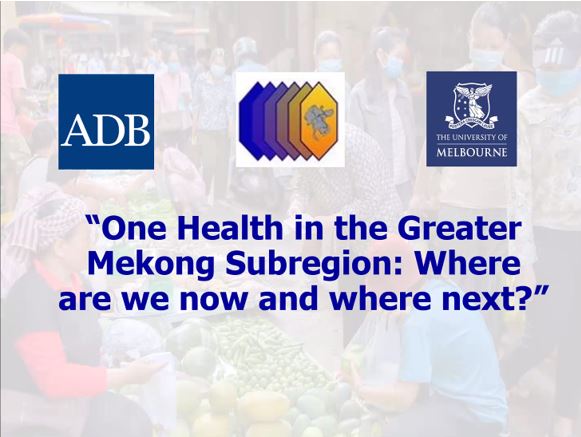One Health in the Greater Mekong Subregion: Where are we now and where next?
COVID-19 has shown how intrinsically human, animal and environmental wellbeing are connected. It is critical to include the One Health lessons learned to date, and a broad range of outbreak preparedness activities in the Greater Mekong Subregion (GMS) regional COVID-19 recovery plan.
 The Regional Meeting for the GMS, hosted by Asia Development Bank and Nossal Institute for Global Health, met to discuss the current status of One Health-relevant systems, policies and approaches. The gathering sought to identify priority next steps for One Health in the GMS.
The Regional Meeting for the GMS, hosted by Asia Development Bank and Nossal Institute for Global Health, met to discuss the current status of One Health-relevant systems, policies and approaches. The gathering sought to identify priority next steps for One Health in the GMS.
One Health creates synergies between platforms and programs, and speaks to the wellbeing of the whole community. Attendees from the agriculture, health and environment sectors endorsed the need to raise the profile of One Health, and discussed the advantages of working across sectors, borders and regional areas as key to reducing the risk of the next pandemic.
It’s exciting to have so many different sectors represented at the Meeting. It bodes well for Cross-sectional collaborations.Dr Angus Campbell
Dr Angus Campbell’s presentation outlining the advantage of a systems-based approach to One Health was complemented by the reflections on current One Health activities and approaches in the GMS of Dr Ly Sovann , Director of the Communicable Disease Control Department of Ministry of Health and Dr Ratanaporn Tawangvivat, Chief of Coordinating Unit for One Health, Department of Disease Control, Ministry of Public Health, Thailand
Nossal Institute Director, Professor Barbara McPake, reminded participants as emerging Infectious disease events are unpredictable, risks cant be we can’t reasonably assessed using traditional quantitative methods. Professor Barbara McPake advocates using a qualitative business case for One Health.
We should focus on the overall nature of the return, and the return are likely to would be high. We can’t ignore the important to focus on the measurable.Professor Barbara McPake
The Biodiversity of the GMS makes the area key for global safety. Collaborative activities are essential for real and sustainable practice. Emerging risks can be dealt with successfully when there is regional cooperation ensuring no nation is left behind.
The engaged participants shared some great discussions and agreed there are many opportunities to work together to encourage ongoing commitment to a One Health approach.
ADB has broad partnerships with developing countries, building on alliances and advancing the One Health Approach. The long-term GMS Strategic Framework 2030 has a strong emphasis on One Health throughout and advocates multi sectoral collaboration and action to ensure regional health security.
The Nossal Institute of Global Health is supporting ADB in the GMS region by assessing the capacity to implement One Health at a regional level. The Scaling Up One Health program provides technical support to strengthen cooperation in the health sector. This is a subproject of the Strengthening Regional Health Cooperation in the Greater Mekong Subregion project